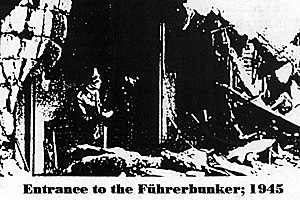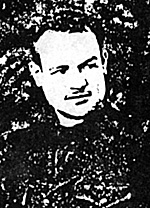Martin Bormann just made mention that ‘Hitler’s Germany’ would rise again after the war. This was a conversation that took place in 1946. DON ANGEL goes on:
“Hitler’s Germany?” I asked. “How can you talk of Hitler’s Germany if the Führer is dead?”
 At right, entrance to the Führerbunker; 1945
At right, entrance to the Führerbunker; 1945
Bormann regarded me seriously before answering. “You yourself saw the Führer leave the bunker. And if you saw him leave, then he could not have died there.”
“Yes, I saw him leave,” I agreed, “but I have no idea what happened to him after that. He could have returned for all I know.”
Bormann said nothing for a full minute. “Do you want to know where Adolf Hitler is today?”
“I am more concerned to know if he is alive.” I answered. “As to where he is - it is not so important.”
“You are right. It is as important for our followers to know that he is alive as for the Allies to believe him dead.”
Then he told me the incredible story of Hitler’s fate. He said, “Listen to me carefully and remember what I say. It is true. When Adolf Hitler left the Führerbunker, he was barely conscious of what was happening. After months of fighting the enemy on the battlefield and the treachery in his own camp, he was both mentally and physically exhausted.
“But time and again he expressed to me his resolution to die with German soldiers around him. This I could not allow to happen. Hitler was the embodiment of the National Socialist cause. One could not survive without the other. At least not then.
“By the 21st of April (1945) it was obvious that the war was lost. It became necessary to countermand the Führer’s wishes and remove him physically from the bunker. I arranged to have him driven secretly from Berlin to Rottach am Egern, escorted by officers from my personal staff. Only a handful of people besides myself knew that the Führer was there, and these were people whom I knew could be trusted to keep the secret of his escape for as long as it was necessary.
“From Rottach he was driven across Germany and smuggled by ship to Norway. Two of my agents kept him in a place many miles from the nearest village until arrangements were completed for him to leave Europe.”
I asked “What of Eva Braun and the suicide?”
“Eva Braun never arrived in Norway. Unfortunately she was given an overdose of drugs from which she later died. As for the suicide, I was the author of the story that Hitler and Eva Braun committed suicide and their bodies burned with petrol. Those witnesses who afterwards testified to this end had been carefully briefed on my instructions.”
Bormann leaned intently across the table; “That Hitler did not die I know. I also know that he is still alive but more than that I am not prepared at the moment, to tell you.” And with that I had to be content.
Yet later in a fantastic - and on reflection - nightmarish, mission I was to be shown near conclusive evidence that what he had said was true. But even now I gradually began to accept the incredible fact - Adolf Hitler was still alive.
Bormann told me he believed the news of Hitler’s death was a source of satisfaction and pleasure to the Allies. He believed that with Hitler dead, the Allies would accept that Nazism could not be rebuilt. Bormann also wanted to perpetuate the myth of his own death for the same reason. On a number of occasions throughout our U-Boat journey, he asked me what I would ever do if his name cropped up in conversation. during one such conversation, I assured him:
“Martin, from me everyone will believe you are dead.”
This pleased Bormann. “That is what I wanted to hear.” but he added, “Not that I died here. Tell them I died on the battlefield fighting the Bolsheviks.”
Then I suggested to Bormann that he had given me so much information, and since I was the only person in the world who could tell the world that he was still alive, he might never allow me to return from this journey.
”I am more or less your prisoner.” I told him.
Bormann chuckled and rose from his bunk on which he had been lying. He reached out and clasped my hand in his. “There is no question of your remaining my prisoner. You have proved yourself a good friend and a loyal member of the Party. There are of course, certain things I cannot tell you. It is simply not convenient that you know everything, but that does not mean that I do not trust you. I am more than confident that you will not reveal the secret of my escape when you return to Spain.”
It was the closest that Martin Bormann and I came to intimate friendship.
Life in a submarine is so claustrophobic that it is impossible for two men to be confined almost entirely to one cabin without their nerves stretching to the breaking point. There were times when I positively loathed Bormann. I remember clearly one incident -- we had been at sea for a week when one of the crew fell seriously ill and the U-Boat doctor reported that the man’s condition was extremely grave. For want of something to do, I remarked to Bormann “I think I will go and talk with this poor fellow. Perhaps I might be able to cheer him up.”
Bormann’s reply shocked and surprised me. Testily he snapped in a harsh voice, quite out of character “Why waste your time. This is of no importance to you. Do not bother yourself with it. What happens to this man can in no way affect our future.”
This sort of insensitive attitude shook me. It might have been acceptable coming from the warped brain of a man like Himmler. But from Bormann, who loathed Himmler in any case, it seemed unnecessarily brutal. In due course, the sailor died. Bormann was quite unaffected by the man’s death and when I asked what they did with a man who died on a submarine, he leered and replied “Yes, we eat them.”
In fact, shortly afterwards, we had surfaced and the crew were ordered onto the upper deck where I presume the poor wretch was given a naval funeral.
But in the main, I must say Bormann proved an interesting and pleasant companion. Our talks together ranged over every conceivable subject. When you are shut in a steel tomb under the sea, it becomes necessary to find an outlet in talking about everything - and nothing.
Within a week I had developed a kind of U-Boat craziness and experienced bouts of depression and physical sickness. Bormann comforted me by saying that this was not unusual even in hardened U-Boat crews, and advised me to think of the future.
“At the moment, everyone is talking about the destruction of our cause.” he told me. “For them, the battle has been fought but for us, this is not the case. While they content themselves with editing their diaries, we prepare a new chapter in the history of the Nazi Party. Time will soon come when their nerves will be as shattered as ours are down here. You must cheer up. We will soon be off this damned submarine and back on dry land - and it has not really been very long since we left Spain.”
But to me it seemed that we had been at sea and trapped in our metal box for half a lifetime and I refused to be comforted. I envied Captain Jui his patience and acceptance of this unnatural life. However, I knew that he had spent the whole war in U-Boats. He had been in the early years a First Leutnant in a submarine similar to this, operating in the North Atlantic. most of his war had been spent patrolling the Western Approaches to Europe, and he had been in at the sinking of seven Allied ships. for his part in these actions he had been awarded the IRON CROSS and in late 1944, had been given command of his own U-Boat. He had been at sea at the end of the war and had received special orders to take his boat to a secret island base off the South American coast and await further orders.
More Don Angel Alcazar de Velasco
-
Part 1: Berlin 1945 and Hitler's Bunker (#110)
Part 2: From Spain 1944 to Berlin 1945 (#111)
Part 3: Meeting Hitler (#112)
Part 4: Meeting Bormann (#113)
Part 5: Final Days of April 1945 (#114)
Part 6: Hitler Alive? Leaving Berlin (#115)
Part 7: Hitler Arrives at Bavarian Redoubt (#116)
Part 8: Escape to Switzerland and Spain (#117)
Part 9: Martin Bormann Arrives in Spain (#118)
Part 10: Martin Bormann in Spain 1946 (#119)
Part 11: Martin Bormann Leaves Spain (#120)
Part 12: Martin Bormann and Hitler (#121)
Part 13: U-Boat Trip to Argentina (#122)
Part 14: South America and Hitler, 1952 (#123)
Part 15: Martin Bormann, 1957 (#124)
Part 16: Home to Madrid (#125)
Note:

This story began in KTB #110 and is quite an eye-opener, but this is only the tip of the iceberg! The first part of this incredible story is the very long letter sent to us some years ago by DON ANGEL ALCAZAR de VELASCO (158-+-1985), Chief of the Spanish spy ring working for the Hitler Government during World War II.
Was he really a spy working for the Hitler Government? Yes, we confirmed this with CAPT BOB THEW (333-+-1987) when BOB was in our HQ some years ago. He said that DON ANGEL was not a very good agent, but he certainly was one. And from the other side, PETER HANSEN (251-LIFE-1987) also confirmed DON ANGEL was an agent for Germany but not a very good one. Is everything in the letter from DON ANGEL true? Judge that for yourself - but wait until all the data has been presented.
Please remember that we ask you to keep these facts in mind while reading this incredible story by DON ANGEL.
- 1) DON ANGEL was an ardent NAZI throughout the War and up to the time of his death. This is obvious from time to time in the text of this letter, so don’t let it bother you.
2) Spies and agents usually tend to embellish their feats and DON ANGEL was no different, so we must ‘add a grain of salt’ to some of these revelations.
3) There are twists and turns in this long letter; some HARD facts in our files we’ll print after this letter. DO NOT FORM AN OPINION until you have read all the amazing facts you’ll see here on our INTELLIGENCE PAGE.
Back to KTB #121 Table of Contents
Back to KTB List of Issues
Back to MagWeb Master Magazine List
© Copyright 1996 by Harry Cooper, Sharkhunters International, Inc.
This article appears in MagWeb (Magazine Web) on the Internet World Wide Web. Other military history articles and gaming articles are available at http://www.magweb.com
Sharkhunters International, Inc., PO Box 1539, Hernando, FL 34442, ph: 352-637-2917, fax: 352-637-6289, e-m: sharkhunters@hitter.net
